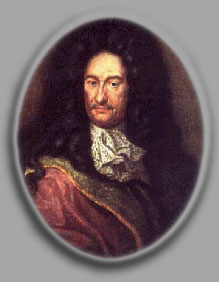|

Gottfried
Willhelm Leibniz
|
Starting
from primordial concepts of the occidental rationale formation,
the opera "Leibniz" intends to artistically comment the primitive
relations between art and science in a time in history where these
elements blended with metaphisical concepts. The 17th century
German thinker Gottfried Wilhelm Leibniz embodies perfectly this
goals: thinker, philosopher, ambassador, librarian, mathematician,
astronomer, mistic and visionary. His contributions span from
humanistic critics on Descartes' rational philosophy, to the invention
of numeric calculus, passing through his diplomatic attempts at
a reunification of protestans and catholics. In 1675, serving
as an ambassador at the court of Louis XIV - the Sun King - he
wrote a recently discovered text entitled 'Drôle de Pensče' (bizarre
thoughts). In it he dreams a permanent event - the 'representation'
- where cosmology, art, circus, theatre, panting, botanics, martial
arts, etc. or 'all the conquests of the human imagination' would
be united at an exposition open to the public or selected groups.
These representations' goal would be to broaden the immaginative/perceptual
horizon of the spectators, as well as to provide monetary income
to artists, scientists and all creators of new proposals. |